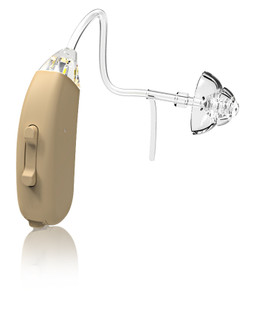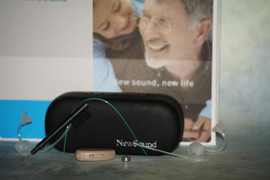Finding Strength in Silence The Emotional Journey of Hearing Loss and How to Cope
Posted by DR Paul on Jul 01, 2024
Hearing loss can feel like an isolating experience, disconnecting us from the vibrant sounds of life. Whether it's the laughter of loved ones, birds chirping at dawn, or the symphony of a bustling city, sound is an intrinsic part of our daily existence. When it begins to fade, the emotional toll can be profound. This blog post aims to shed light on the emotional challenges of hearing loss and offer practical coping mechanisms to help you or your loved ones regain a sense of normalcy. We'll explore the psychological impact of hearing loss and provide actionable steps to mitigate these effects.
Understanding Hearing Loss
What Is Hearing Loss?
Hearing loss occurs when there's a problem with one or more parts of the ear. It can affect anyone at any age and can range from mild to severe. Understanding the basics of hearing loss is crucial as it helps in identifying the right treatment options.
Types of Hearing Loss
There are three main types of hearing loss:
Conductive Hearing Loss - Occurs when sound waves can't reach the inner ear.
Sensorineural Hearing Loss - Happens due to damage to the inner ear or the nerve pathways from the inner ear to the brain.
Mixed Hearing Loss - A combination of both conductive and sensorineural hearing loss.
Common Causes
Hearing loss can be caused by various factors, including aging, noise exposure, infections, and genetics. Recognizing these causes can guide preventative measures and treatments.
The Emotional Impact of Hearing Loss
Isolation and Loneliness
Hearing loss often leads to social withdrawal. Difficulty in following conversations may lead to avoiding social gatherings, which in turn, fosters feelings of isolation and loneliness.
Depression and Anxiety
The struggle to communicate effectively can lead to frustration and low self-esteem. Over time, these feelings can spiral into depression and anxiety, affecting overall mental health.
Identity and Self-Worth
For many, hearing loss can alter their sense of identity. The inability to engage in familiar activities can diminish self-worth and lead to a crisis of identity.
Coping Mechanisms for Emotional Challenges
Seeking Professional Help
Consulting with audiologists and mental health professionals can provide a comprehensive approach to managing hearing loss. These experts can offer tailored strategies for coping.
Joining Support Groups
Connecting with others who share similar experiences can be incredibly therapeutic. Support groups offer a safe space to share feelings and receive encouragement.
Utilizing Hearing Aids
Modern hearing aids can significantly improve quality of life. Platforms like hear-better.com offer a wide range of hearing aids that cater to different needs and preferences.
Practical Tips for Daily Living
Enhancing Communication Skills
Learning new ways to communicate, such as lip-reading and sign language, can bridge the gap created by hearing loss. These skills can make daily interactions smoother.
Creating a Hearing-Friendly Environment
Adjust your living spaces to better suit your needs. Simple changes like reducing background noise and using visual alerts can make a significant difference.
Leveraging Technology
Various apps and devices are designed to assist those with hearing loss. From speech-to-text apps to advanced hearing aids, technology can play a pivotal role in improving daily life.
The Role of Family and Friends
Being Supportive and Understanding
Family and friends should educate themselves about hearing loss to offer better support. Patience and understanding can go a long way in making the affected person feel valued.
Encouraging Social Interaction
Encouraging participation in social activities can help combat feelings of isolation. Adapt activities to ensure they are enjoyable and accessible.
Effective Communication Tips
Learning how to communicate effectively with someone experiencing hearing loss can make conversations more meaningful. Speak clearly, maintain eye contact, and ensure you have their attention before speaking.
The Importance of Regular Hearing Tests
Early Detection
Regular hearing tests are crucial for early detection of hearing issues. Early intervention can significantly improve outcomes and quality of life.
Monitoring Progress
Routine check-ups help in monitoring the effectiveness of treatments and making necessary adjustments.
Professional Guidance
Audiologists can provide valuable advice and recommendations based on the latest advancements in hearing care.
Addressing the Stigma Around Hearing Loss
Changing Perceptions
Educating the public about hearing loss can help change negative perceptions. Awareness campaigns and educational programs can play a significant role.
Promoting Inclusivity
Workplaces, schools, and public spaces should adopt inclusive practices to accommodate individuals with hearing loss.
Building Confidence
Encouraging individuals to be open about their hearing loss can build confidence and reduce feelings of shame or embarrassment.
Financial Considerations
Insurance and Coverage
Understanding your insurance coverage for hearing aids and related treatments is essential. Many plans now offer partial or full coverage for hearing aids.
Budget-Friendly Options
Affordable hearing aid options are available for those on a tight budget. Platforms like hear-better.com offer a variety of cost-effective solutions.
Financial Assistance Programs
Various organizations provide financial assistance for purchasing hearing aids. Research and apply to these programs to alleviate financial burdens.
The Future of Hearing Aid Technology
Innovations in Hearing Aids
The future of hearing aids looks promising with advancements in AI and wearable technology. These innovations aim to provide a more natural hearing experience.
Integrating AI
AI can enhance the functionality of hearing aids by adapting to different environments automatically, providing a seamless user experience.
Personalized Solutions
Future developments focus on creating personalized hearing solutions tailored to individual needs and preferences.
Personal Stories of Overcoming Hearing Loss
Inspirational Journeys
Hearing inspiring stories from people who have successfully managed their hearing loss can provide hope and motivation.
Lessons Learned
These personal accounts offer valuable lessons and practical tips for coping with hearing loss.
Community Support
Building a community where people can share their experiences and support each other is crucial for emotional well-being.
Conclusion
Hearing loss is a significant challenge, but it doesn't have to dictate the quality of your life. By understanding its emotional impact and adopting effective coping mechanisms, you can regain control and lead a fulfilling life. Whether it's utilizing technology, seeking professional help, or leaning on a supportive community, there are numerous ways to manage and overcome the emotional hurdles of hearing loss. Visit hear-better.com to explore various hearing aid options and start your journey towards better hearing and improved well-being today.










